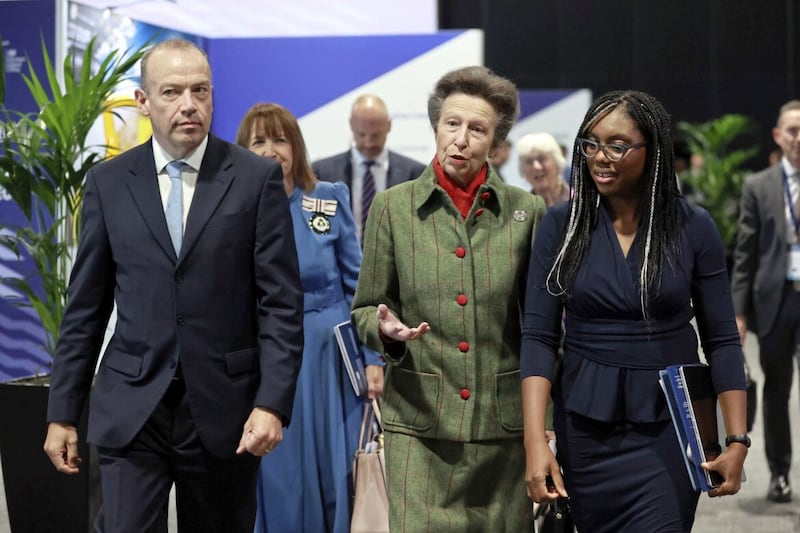FINDINGS from a new CBI/Pearson education and skills survey have confirmed something that we have suspected for some time – that companies in Northern Ireland are crying out for talent to fill high-skilled roles. More than four in five local businesses expect to hire in high-skilled roles in the next three to five years; but only three in every ten companies (29 per cent) are confident of having the supply of talent they need to fill them.
While the data showed that this was a common problem across the UK, the situation is far more acute in Northern Ireland. At a UK level, 75 per cent of businesses foresee a need to fill high-skilled roles in the next few years, while in Northern Ireland the figure is 80 per cent. We know that higher and further education is critical to developing the next generation of high-skilled talent and with local universities receiving lower funding relative to the rest of the UK, this is an area that needs immediate attention.
Although we often prioritise current and short-term skills shortages, it is important to be forward-thinking and consider future skills needs for the medium and longer term. Here in Northern Ireland we are trying to build an innovative economy for the future with significant investment in high-skilled, rapid growth sectors like financial technology (fintech), precision medicine and engineering. Securing a steady supply of talent will be essential if we want to make this a reality and steal a march on our international competitors.
Importantly, one of the biggest differences between Northern Ireland and the rest of the UK reported in the CBI survey was with-regard to demand for and supply of low and intermediate skilled workers. Companies in Northern Ireland see greater need for low (25.4 per cent) and intermediate skilled (46.2 per cent) workers in the coming years than their UK counterparts, at 20 per cent and 43.2 per cent respectively.
As with high-skilled roles, Northern Irish firms also foresee greater challenges in meeting these needs. Around a quarter (24.7 per cent) of Northern Irish firms lack confidence in being able to fill low skilled vacancies, compared to less than a fifth (18.1 per cent) of UK companies. This is mirrored in supply of intermediate skilled jobs, with 45.8 per cent of Northern Irish firms expressing concern about being able to fill vacancies compared to just 38.2 per cent of UK employers.
What this latest survey shows is that is that Northern Ireland is experiencing a skills gap across all levels and this situation is being exacerbated by uncertainty caused by Brexit.
Take for example our burgeoning reputation as world class destination for culinary excellence and hospitality. One of the key drivers of this success has been an ability to source top-quality local produce from our hugely successful agri-food sector. To stay ahead of the game, the agri-food sector is dependent on sourcing a wide range of workers at all skill levels and there is real concern from companies in the sector about the risk of post-Brexit labour shortages.
Indeed, even before any post-Brexit limitations on inward migration might be imposed, some of Northern Ireland’s leading companies are experiencing critical shortages in labour supply. Nowhere is this more acute that mid-Ulster where our leading global engineering companies are operating in a part of Northern Ireland where the claimant count unemployment level is already below 2 per cent.
While skills shortages warrant legitimate cause for concern, there has been a real willingness amongst businesses to work with what they have and commit to retaining and developing existing staff. Even in challenging economic environment, almost 40 per cent of Northern Irish businesses plan to expand existing training programmes. Firms in the region are also well ahead of UK counterparts in having a dedicated learning and development strategy – with more than 90 per cent of firms offering a development strategy compared to just 76.6 per cent of UK companies.
There is another aspect of making the best of what you have and that’s helping businesses become able to access existing talent through improved connectivity. Infrastructure projects like the A5 & A6, York Street Interchange and Belfast Transport Hub can all help to connect people to the places where jobs are being created. Flexible working also has a role to play and Northern Ireland must take advantage of new technologies to improve digital connectivity.
On education, the survey makes it clear that we need to make significant progress in aligning education with the needs of modern businesses. One of the crucial things for achieving this is improving careers services. More than 55 per cent of Northern Irish businesses believe poor careers advice to be a major cause of skills shortages. There is an obvious opportunity here for business to make a positive contribution and more than 80 per cent of Northern Irish firms said they would be willing to play a greater role in supporting careers advice in schools and colleges.
Before the collapse of the Executive in January, we were working towards the target of making Northern Ireland one of the top three most competitive small economies in the world. It’s an ambitious target and one we won’t certainly be able to meet if businesses remain hamstrung by skills shortages at all levels.
A successful economy needs to be underpinned by an education and skills system that is fit for purpose in a modern economy. The fact that our system is currently falling short is yet another reminder that we desperately need to get the Executive back up and running to get things back on track. Any more delays and we could face the prospect of falling further behind.
:: Angela McGowan is regional director of CBI NI. Follow her on Twitter @angela_mcgowan








